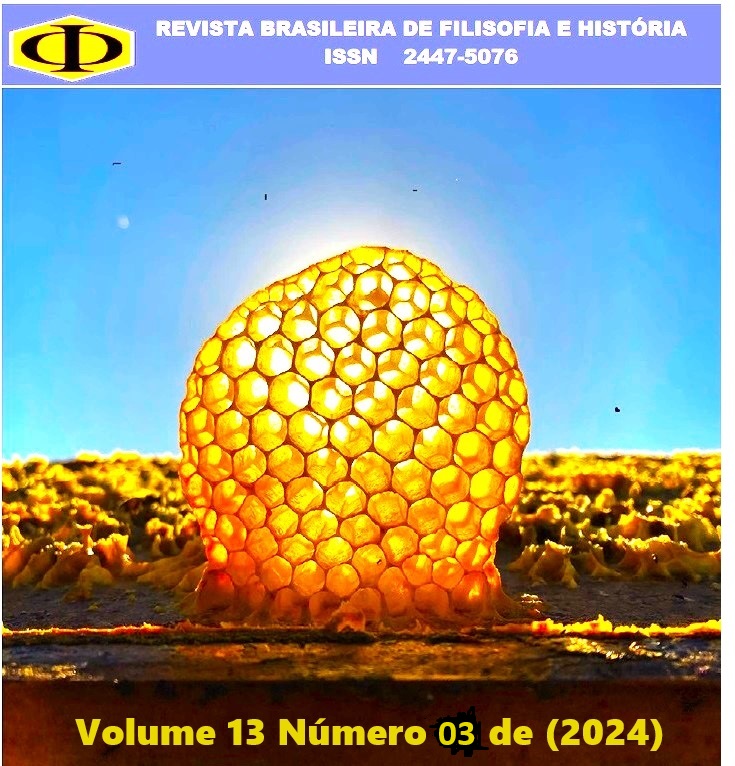Um robô pode julgar? Sobre o uso da abdução em filosofia do direito
DOI:
https://doi.org/10.18378/rbfh.v13i3.10792Abstract
This paper considers two important points in the Philosophy of Law. Firstly, it analyses the possibility of a robot (a computational system) playing the role of a judge in some situations at least, and, secondly, it analyses the use of abductive reasoning in this field. We conclude that, with few exceptions, a robot cannot substitute a judge and that abductive reasoning should be considered a valid form of inference in Law.
References
AERTS, D. et al. Why the logical disjunction in quantum logic is not classical. Disponivel em: https://arxiv.org/abs/quant-ph/0007041. Acesso em: 10/09/2024.
BLAIR, H. A. et al. Paraconsistent Foundations for Logic Programming, Journal of Non-Classical Logic, vol. 5, no. 2, pp. 45-73, 1988.
COSTA, N. C. A. VERNENGO, R. Sobre algunas lógicas paraclássicas y el análisis del razonamiento jurídico. Dona 19: 183-200, 1999.
KRAUSE, D. Lógica Paraconsistente. Scientific American Brasil, Novembro. No. 30: 70-77, 2004.
KUMAR, M. Quantum: Einstein, Bohr and the Great Debate About the Nature of Reality. London: Icon Books, 2008.
MAKINSON, D. Bridges from Classical to Nonmonotonic Logic. London: Kings College Pu., 2005.
SHAPIRO, S. KISSELL, T. K. Classical First-Order Logic. Cambridge: Cambridge Un. Press (Cambridge Elements: Philosophy and Logic), 2022.
STRASSER, C. et al. Non-monotonic Logic, The Stanford Encyclopedia of Philosophy (Summer 2019 Edition), Edward N. Zalta (ed.). Disponível em: https://plato.stanford.edu/archives/sum2019/entries/logic-nonmonotonic/. Acesso em: 10/09/2024.
WEINBERG, S. The First Three Minutes: A Modern View of the Origin of the Universe. New York: Basic Books, 1993.
Downloads
Published
How to Cite
Issue
Section
License
Copyright (c) 2024 Decio Krause

This work is licensed under a Creative Commons Attribution-NonCommercial-NoDerivatives 4.0 International License.
Esta é uma revista de acesso livre, onde, utiliza o termo de cessão seguindo a lei nº 9.610/1998, que altera, atualiza e consolida a legislação sobre direitos autorais no Brasil.
Autores que publicam na Revista Brasileira de Filosofia e História (RBFH) concordam com os seguintes termos:
O(s) autor(es) doravante designado(s) CEDENTE, por meio desta, cede e transfere, de forma gratuita, a propriedade dos direitos autorais relativos à OBRA à Revista Brasileira de Filosofia e História (RBFH), representada pelo Grupo Verde de Agroecologia e Abelhas (GVAA), estabelecida na Rua João Pereira de Mendonça , 90 Bairro Petropolis em Pombal - PB doravante designada CESSIONÁRIA, nas condições descritas a seguir: 1. O CEDENTE declara que é (são) autor(es) e titular(es) da propriedade dos direitos autorais da OBRA submetida. 2. O CEDENTE declara que a OBRA não infringe direitos autorais e/ou outros direitos de propriedade de terceiros, que a divulgação de imagens (caso as mesmas existam) foi autorizada e que assume integral responsabilidade moral e/ou patrimonial, pelo seu conteúdo, perante terceiros. O CEDENTE cede e transfere todos os direitos autorais relativos à OBRA à CESSIONÁRIA, especialmente os direitos de edição, de publicação, de tradução para outro idioma e de reprodução por qualquer processo ou técnica através da assinatura deste termo impresso que deverá ser submetido via correios ao endereço informado no início deste documento. A CESSIONÁRIA passa a ser proprietária exclusiva dos direitos referentes à OBRA, sendo vedada qualquer reprodução, total ou parcial, em qualquer outro meio de divulgação, impresso ou eletrônico, sem que haja prévia autorização escrita por parte da CESSIONÁRIA.














